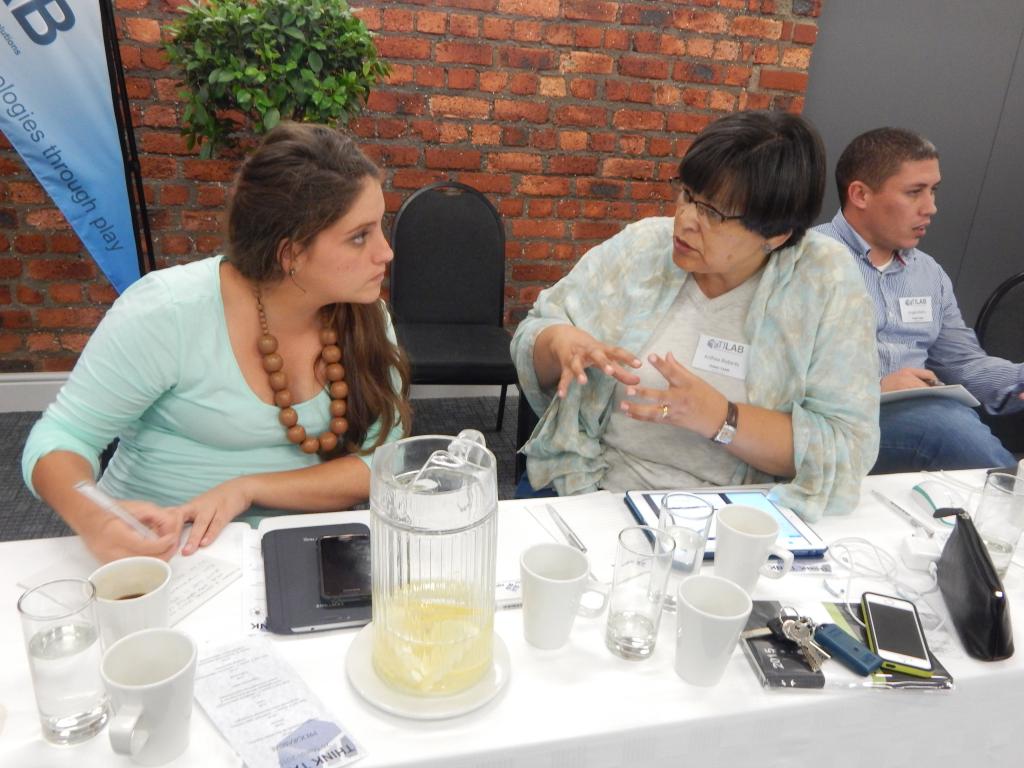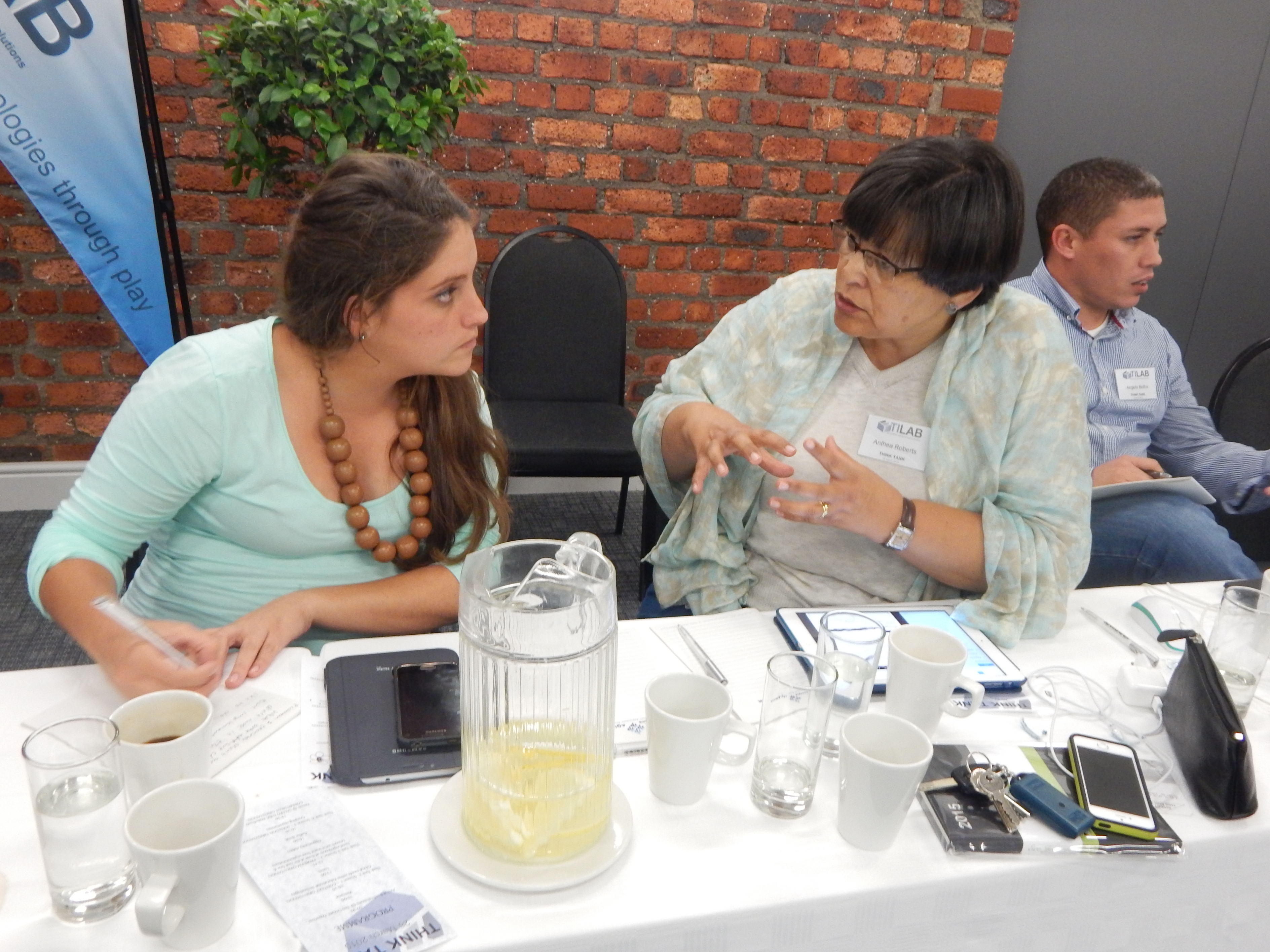ETILAB hosts Teaching and Learning Think Tank


The Educational Technology Inquiry Lab hosted a second Think Tank event at the Two Oceans Aquarium in March 2015. Established in 2013, the Educational Technology Inquiry Lab is an initiative of the UCT School of Education designed to facilitate inquiry into educational technology research and pedagogies. The ETILAB creates a space for educators and academics to explore best practice e-learning techniques and to experiment and prototype innovative teaching methods for the classrooms of the future.
The Think Tank events are hosted four times a year with the goal of building bridges between different role players from industry, content developors, government and educators. The March 2015 event was sponsored by Technology Company LENOVO, and treated more than 40 participants to a day of thinking-together, networking and creative problem-solving. The ETILAB team is led by Prof Dick Ng’ambi, who believes that “finding solutions to our current educational challenges, starts with seeing problems as opportunities for innovation.” It is this vision that shaped the course of the second ETILAB Think Tank.
According to ETILAB team member, Isabel Tarling, the ETILAB process always begins with developing a deep and exhaustive empathy and understanding for the context in which a specific problem is experienced. “Too often when identifying problems we rely on our perceptions of a situation without having all the facts and we make assumptions about the problem based on unfounded beliefs. A careful analysis of the context makes it easier to clearly identify the precise nature of the problem that needs to be addressed” says Tarling.

Speaking at the event, Prof Dick Ng’ambi focused on the use of Educational Technologies, with specific reference to anticipated trends in the next 5 years based on the Horizon Report 2014. This was followed by a lively presentation on Massive Open Online Courses (MOOCs) and Open Educational Resources (OERs) by Dr Cheryl Brown of UCT’s Centre for Innovation in Learning and Teaching (CILT). Mr Clinton Walker, Head of e-Learning at the Western Cape Education Department (WCED), shared the Western Cape Government’s vision for e-learning in schools. This included sharing the goal of placing a tablet in each Western Cape learner’s hand within the next 5 years, and the goals the WCED have set in order to achieve connectivity and content delivery for this. The diverse audience of educators, industry specialists and content developers engaged with him on issues such as appropriate content development and delivery mechanisms, internet access and intranet accessibility, and school’s access across the spectrum to these roll-outs. In a presentation peppered with humour and excellent insights, Kobus van Wyk from Mustek, shared with the group lessons he has learnt over the last decades regarding the implementation of technologies in South Africa’s schools.
Educators were also given the opportunity to share their challenges and ideas. Masikhule is an organisation in the Helderberg, just outside Cape Town, that trains approximately 300 women from Early Childhood Development centres each year (reaching more than 2000 disadvantaged children). Although technology use in these types of schools is not a reality at the moment, having for example container-type technology centres would greatly improve teachers and principals’ access to the affordances offered by various technologies. In addition, Melissa Prout and Bronwyn Hills, (Pinelands North Primary School), Peter Schutte (Wynberg Girls High School) and Shirley Humphreys (San Souci Girls), spoke of their passion for integrating technology into traditional classroom learning. These teachers, are helping to develop a ‘new normal’ in their schools regarding the use of technologies in teaching.
“While learners and educators are extremely enthusiastic about the possibilities of teaching and learning with technologies, they lack material resources to place tablets in the hands of each of their learners, and Mr Walker’s presentation filled them with tremendous hope for the future of education” says Prof Ng’ambi.
As the sponsor of the day, LENOVO presented their latest ‘shock proof’ technology: tablets that are designed to be indestructible having been vigorously tested, dusted and button-tested to ensure that they are ‘learner-safe’. The final and much anticipated session was a crash-course in the ETILAB process presented by Puleng Makhoalibe, Humanities ICT Manager. Puleng has worked closely with ETILAB and has also trialled the process with a group of UCT Masters’ Educational Technology Students.
“The response from participants, following this year’s Think Tank has been overwhelming. Many have written to thank the ETILAB TEAM for the fresh and invigorating approach, congratulating and praising the speakers for their vibrant and engaging presentations and expressing their gratitude for being a part of it. Almost all have already booked their seats at the next Think Tank on the 25 June 2015!” said Prof Ng’ambi.